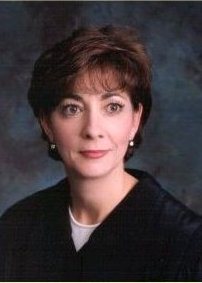Report on the fourteenth day of trial from the Episcopal Church in South Carolina
July 25, 2014 (Day 14)
The trial ended about 3 p.m. today. Judge Diane Goodstein thanked all parties for “a remarkable trial” and said she will not issue a ruling for at least 90 days.
Day 14 began just after 10 a.m. with testimony from Mark Lawrence, who was a bishop in The Episcopal Church from January 2008 until December 2012. He continues to serve as bishop of the breakaway group that is calling itself “The Protestant Episcopal Church in the Diocese of South Carolina” but has left The Episcopal Church.
On the witness stand, Bishop Lawrence recalled being interviewed as a candidate in the search that resulted in his becoming bishop. He said no one ever asked him if he would be willing to take the diocese out of The Episcopal Church. Asked if he had intended to take the diocese out of the church, he replied, “Absolutely not.”
He described a telephone meeting with Presiding Bishop Katharine Jefferts Schori on October 15, 2012, along with their respective chancellors, David Beers for the Presiding Bishop and Wade Logan for Bishop Lawrence. He said that was the first time he had been notified that a disciplinary board for bishops had heard a complaint against him and had issued a “Certificate of Abandonment of The Episcopal Church” against him. The Presiding Bishop informed him that she was placing a restriction on his ministry, as required by the Canons of the church. (The disciplinary action also gave the bishop 60 days to respond; he did not do so.)
The testimony then began to focus on whether Bishop Lawrence was properly served with paperwork for the Certificate of Abandonment and the Notice of Restriction; and whether correct procedures were followed on December 5, 2012, when the Presiding Bishop accepted his renunciation as bishop and removed and released him from ordained ministry in The Episcopal Church.
Mary Kostel, attorney for The Episcopal Church, again raised an objection to the court going into the question of whether church rules had been followed. The judge has ruled throughout the trial that under the First Amendment, courts are bound to accept the determinations of church authorities and not “go behind” such decisions.
But the judge permitted the testimony. “I want the record to be clear the reason this is important is for the purpose of the court’s ability to be able to determine whether the action that was taken by Bishop Lawrence pursuant to civil law in South Carolina were taken in his capacity as a managing agent,” she said.
Mr. Runyan spent some time at the podium addressing the judge about his theories on why the procedural questions were relevant. Mr. Beers objected: “He was making a speech and alleging a lot of facts about The Episcopal Church that are not in evidence.” The judge agreed: “I think you are exactly correct” — but let Mr. Runyan go on for a while longer about whether The Episcopal Church had acted properly.
Finally, the judge called a 30-minute recess to consider the matter. When she returned she began asking questions about whether Bishop Lawrence actually had any authority to act after November 17, the date when he publicly announced that he was no longer a bishop of The Episcopal Church. At that point, Mr. Runyan withdrew the question and moved on.
Bishop Lawrence was cross-examined briefly by Mr. Beers about the duties of a bishop; Tom Tisdale, Chancellor of The Episcopal Church in South Carolina, had no questions.
The final hours of the trial were spent entering documents and depositions into evidence and resolving objections that some of the 43 attorneys for the plaintiffs wanted to have preserved for the record.
A major issue to clear up was whether testimony given in depositions about the ordination vows taken by Bishop Lawrence and by Canon Jim Lewis would be considered. The Book of Common Prayer itself has been admitted into evidence. Ordination in The Episcopal Church, following the Book of Common Prayer, includes a promise to “solemnly engage to conform to the doctrine, discipline, and worship of The Episcopal Church.” Through that oath, Mr. Tisdale said, “They come into corporate authority.”
“It imbues them with the authority of the church to become a deacon, priest or bishop… they cannot act in those capacities without taking this,” Mr. Tisdale said. “It give them authority for everything they do… it’s part of the neutral principles consideration. It is a neutral principle.”
But the judge disallowed the statements Bishop Lawrence and Canon Lewis made about their ordination vows. “I think it’s ecclesiastic, and I don’t believe that the ordination ceremonies are intended to, nor will I consider them, as being neutral principles of law.” She agreed to allow those parts of the depositions to be admitted as a “proffer,” information that is kept in the record in the event of an appeal.
After a lunch break, the court hashed out a few more final details; the judge issued final instructions, and wrapped up the proceedings.
“Thank you all for a remarkable trial,” she said. “It has been one of the joys of my life to have spent this time with you. I look forward to the study that I get to embark on.” Then she dismissed the courtroom with the same instruction she gave many of the witnesses: “And… run!”
